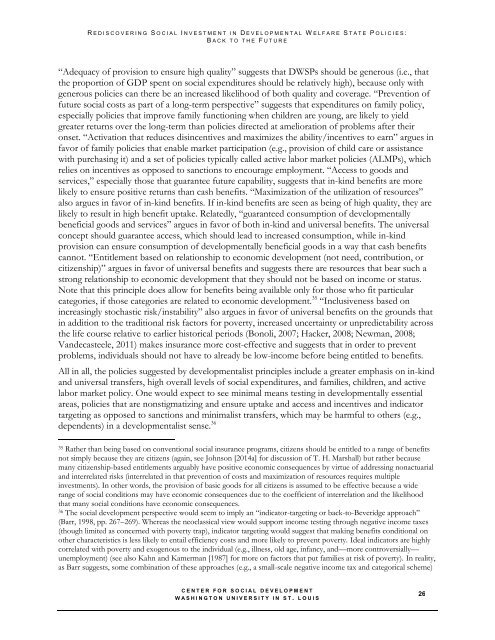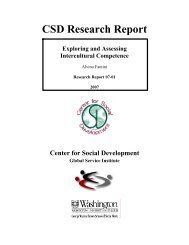Rediscovering social investment in developmental welfare state ...
Rediscovering social investment in developmental welfare state ...
Rediscovering social investment in developmental welfare state ...
You also want an ePaper? Increase the reach of your titles
YUMPU automatically turns print PDFs into web optimized ePapers that Google loves.
R E D I S C O V E R I N G S O C I A L I N V E S T M E N T I N D E V E L O P M E N T A L W E L F A R E S T A T E P O L I C I E S :<br />
B A C K T O T H E F U T U R E<br />
―Adequacy of provision to ensure high quality‖ suggests that DWSPs should be generous (i.e., that<br />
the proportion of GDP spent on <strong>social</strong> expenditures should be relatively high), because only with<br />
generous policies can there be an <strong>in</strong>creased likelihood of both quality and coverage. ―Prevention of<br />
future <strong>social</strong> costs as part of a long-term perspective‖ suggests that expenditures on family policy,<br />
especially policies that improve family function<strong>in</strong>g when children are young, are likely to yield<br />
greater returns over the long-term than policies directed at amelioration of problems after their<br />
onset. ―Activation that reduces dis<strong>in</strong>centives and maximizes the ability/<strong>in</strong>centives to earn‖ argues <strong>in</strong><br />
favor of family policies that enable market participation (e.g., provision of child care or assistance<br />
with purchas<strong>in</strong>g it) and a set of policies typically called active labor market policies (ALMPs), which<br />
relies on <strong>in</strong>centives as opposed to sanctions to encourage employment. ―Access to goods and<br />
services,‖ especially those that guarantee future capability, suggests that <strong>in</strong>-k<strong>in</strong>d benefits are more<br />
likely to ensure positive returns than cash benefits. ―Maximization of the utilization of resources‖<br />
also argues <strong>in</strong> favor of <strong>in</strong>-k<strong>in</strong>d benefits. If <strong>in</strong>-k<strong>in</strong>d benefits are seen as be<strong>in</strong>g of high quality, they are<br />
likely to result <strong>in</strong> high benefit uptake. Relatedly, ―guaranteed consumption of <strong>developmental</strong>ly<br />
beneficial goods and services‖ argues <strong>in</strong> favor of both <strong>in</strong>-k<strong>in</strong>d and universal benefits. The universal<br />
concept should guarantee access, which should lead to <strong>in</strong>creased consumption, while <strong>in</strong>-k<strong>in</strong>d<br />
provision can ensure consumption of <strong>developmental</strong>ly beneficial goods <strong>in</strong> a way that cash benefits<br />
cannot. ―Entitlement based on relationship to economic development (not need, contribution, or<br />
citizenship)‖ argues <strong>in</strong> favor of universal benefits and suggests there are resources that bear such a<br />
strong relationship to economic development that they should not be based on <strong>in</strong>come or status.<br />
Note that this pr<strong>in</strong>ciple does allow for benefits be<strong>in</strong>g available only for those who fit particular<br />
categories, if those categories are related to economic development. 35 ―Inclusiveness based on<br />
<strong>in</strong>creas<strong>in</strong>gly stochastic risk/<strong>in</strong>stability‖ also argues <strong>in</strong> favor of universal benefits on the grounds that<br />
<strong>in</strong> addition to the traditional risk factors for poverty, <strong>in</strong>creased uncerta<strong>in</strong>ty or unpredictability across<br />
the life course relative to earlier historical periods (Bonoli, 2007; Hacker, 2008; Newman, 2008;<br />
Vandecasteele, 2011) makes <strong>in</strong>surance more cost-effective and suggests that <strong>in</strong> order to prevent<br />
problems, <strong>in</strong>dividuals should not have to already be low-<strong>in</strong>come before be<strong>in</strong>g entitled to benefits.<br />
All <strong>in</strong> all, the policies suggested by <strong>developmental</strong>ist pr<strong>in</strong>ciples <strong>in</strong>clude a greater emphasis on <strong>in</strong>-k<strong>in</strong>d<br />
and universal transfers, high overall levels of <strong>social</strong> expenditures, and families, children, and active<br />
labor market policy. One would expect to see m<strong>in</strong>imal means test<strong>in</strong>g <strong>in</strong> <strong>developmental</strong>ly essential<br />
areas, policies that are nonstigmatiz<strong>in</strong>g and ensure uptake and access and <strong>in</strong>centives and <strong>in</strong>dicator<br />
target<strong>in</strong>g as opposed to sanctions and m<strong>in</strong>imalist transfers, which may be harmful to others (e.g.,<br />
dependents) <strong>in</strong> a <strong>developmental</strong>ist sense. 36<br />
35 Rather than be<strong>in</strong>g based on conventional <strong>social</strong> <strong>in</strong>surance programs, citizens should be entitled to a range of benefits<br />
not simply because they are citizens (aga<strong>in</strong>, see Johnson [2014a] for discussion of T. H. Marshall) but rather because<br />
many citizenship-based entitlements arguably have positive economic consequences by virtue of address<strong>in</strong>g nonactuarial<br />
and <strong>in</strong>terrelated risks (<strong>in</strong>terrelated <strong>in</strong> that prevention of costs and maximization of resources requires multiple<br />
<strong><strong>in</strong>vestment</strong>s). In other words, the provision of basic goods for all citizens is assumed to be effective because a wide<br />
range of <strong>social</strong> conditions may have economic consequences due to the coefficient of <strong>in</strong>terrelation and the likelihood<br />
that many <strong>social</strong> conditions have economic consequences.<br />
36 The <strong>social</strong> development perspective would seem to imply an ―<strong>in</strong>dicator-target<strong>in</strong>g or back-to-Beveridge approach‖<br />
(Barr, 1998, pp. 267–269). Whereas the neoclassical view would support <strong>in</strong>come test<strong>in</strong>g through negative <strong>in</strong>come taxes<br />
(though limited as concerned with poverty trap), <strong>in</strong>dicator target<strong>in</strong>g would suggest that mak<strong>in</strong>g benefits conditional on<br />
other characteristics is less likely to entail efficiency costs and more likely to prevent poverty. Ideal <strong>in</strong>dicators are highly<br />
correlated with poverty and exogenous to the <strong>in</strong>dividual (e.g., illness, old age, <strong>in</strong>fancy, and—more controversially—<br />
unemployment) (see also Kahn and Kamerman [1987] for more on factors that put families at risk of poverty). In reality,<br />
as Barr suggests, some comb<strong>in</strong>ation of these approaches (e.g., a small-scale negative <strong>in</strong>come tax and categorical scheme)<br />
C E N T E R F O R S O C I A L D E V E L O P M E N T<br />
W A S H I N G T O N U N I V E R S I T Y I N S T . L O U I S<br />
26
















